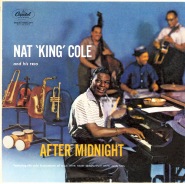A Pile o' Cole's Nat King Cole Website
Site Menu
After Midnight
Recorded August 15th 1956 & September 14th, 21st & 24th 1956
Nat Cole - piano, arranger
John Collins - guitar
Charlie Harris - bass
Lee Young - drums
Harry 'Sweets' Edison - trumpet
Juan Tizol - valve trombone
Jack Costanzo - bongo
Willie Smith - alto sax
Stuff Smith - violin
Lee Gillette - producer
Capitol W-782 (LP) EAP-782 (EP)
- Just You, Just Me
- Sweet Lorraine
- Sometimes I'm Happy
- Caravan
- It's Only A Paper Moon
- You're Looking At Me
- The Lonely One
- Don't Let It Go To Your Head
- I Know That You Know
- Blame It On My Youth
- When I Grow Too Old To Dream
- (Get Your Kicks On) Route 66
"In this felicitious blending ... commercial pop and jazz met in a wildly successful brew."
Once upon a time, ol' King Cole was a merry old soul, and a piano playing soul was he. As The Nat King Cole Trio playing to limited audiences in the 1940's, he could go to and fro from pop ballad or novelty song to jazz playing with the greatest of ease. In all styles, it was hip and best of all, well loved. Moving to the forefront as the fourties turned to the fifties, he found things a bit different. Not only was he Capitolizing on his abilities and popularity as a pop vocalist, I suspect he was also beginning to wonder about his relevance as a pianist in jazz, a field which was proving to be very self concious and contentious about what was "relevant" and "progressive" and what was "old hat."
Through the early 1950s, Nat King Cole found himself in a schism. The future as a vocalist looked so bright he needed sunglasses, but as a pianist there were looming storms and far less prosperous pastures even if he weathered them. Trying to remain vital in jazz brought him twin challenges: the stigma of having commercial success as a vocalist, and the difficulty of remaining "in" with the "in" crowd. Either or both of those problems could have been impossible to overcome with much success. The logical thing to do was to give up the piano.
But Nat certainly didn't become the master he was without loving the instrument and the music intensely. While he gradually came to enjoy singing more and more, he still desired to play, and there were still people wanting to listen. So Nat and Company tried a variety of different ideas in an effort to find a successful way to present Nat as a pop vocalist and a pianist apart from the still excellent but dating Trio. First there were attempts to present Nat as the soloist, as in King Cole at the Piano. That went well musically but rather quietly in both sales and the jazz world. Then they tried selling his piano to the upscale popular "cocktail" market with Penthouse Serenade to a similar reception. Then they tried again, this time to sell his piano in a setting for popular music lovers in The Piano Style of Nat King Cole. As much as these recordings are appreciated now, the results weren't promising as far as the record company and jazz critics at the time were concerned.
After all those angles came After Midnight. In this felicitious blending of The King Cole Trio, Nat as pianist, Nat as vocalist and contributions by select musicians, commercial pop and jazz met in a wildly successful formula brew. Music lovers ate it up and it even sold - very strong sales, in fact.
The enthusiasm of listeners was plainly shared by the participants including Nat. As with the fully packed The Piano Style of Nat King Cole, Nat cut enough material for two albums, despite the fact that a good chunk of it clearly wasn't going to be used. It's as obvious of an indicator as one can get that he wanted to make records at the keys, that in both occasions he took the opportunity for all it was worth. The tracks not used on the original release of After Midnight would sit on the shelf for thirty years before finally being used in a reissue; they proved to be equal to the tracks which were used!
Playing this album, all the concerns and cares vanish, nowhere to be found, and it's not very hard to share the enjoyment and enthusiasm. It has that ineffable "something" which makes listening absorbing and a pleasure. The songs are a mixture of hits Nat had in the past, a few standards, and a few new songs. For new songs, my favorite is Don't Let It Go To Your Head, an example of Nat's amazing ability to be sarcastic, mean and snarky without losing his poise, class and innate likeability. The evocative Caravan is a standard by Duke Ellington, and indeed features the very same fellow on valve trombone whose playing had helped distinguish Duke's original, Juan Tizol. Rather than being inferior remakes, the songs which were previous hits by The Nat King Cole Trio (Route 66, It's Only a Paper Moon, Sweet Lorraine) are all fresh here.
The problem for the future was that this was a summation of the past accomplishments and a realization of its potentials; which only served to underline the absence. Capitol apparantly decided to leave this as a successful pinnacle and an ending of that phase of his career and to quit at the top, rather than attempt to glean new possibilities from the success and make risky experiments to find a way to continue the creative and commercial success. Despite being the most successful recording of Nat as a pianist, it also stands as the last major body of work in the trio contexts and the last substantial recording of Nat King Cole - piano.
